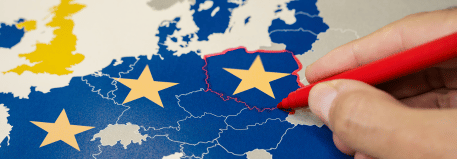Objectives of CBAM
CBAM has several objectives, including:

Reducing carbon leakage
Carbon leakage occurs when companies relocate their production to countries with less stringent climate regulations to avoid the costs of carbon emissions. CBAM aims to counteract this by applying a carbon price to imported goods, thereby reducing the incentive to relocate production.

Encouraging global climate action
By introducing a carbon price on imported goods, CBAM encourages other countries to take similar climate measures. This can lead to broader acceptance of carbon pricing worldwide.

Protecting the EU industry
CBAM helps to protect the competitiveness of EU companies by ensuring that imported goods bear the same carbon costs as goods produced within the EU.
How does CBAM work?
CBAM works by applying a carbon price to certain imported goods. This process involves several steps:
Identification of sectors
CBAM initially focuses on sectors with a high risk of carbon leakage, such as steel, cement, electricity, fertilizers, and aluminum.
Calculation of carbon content
For each imported good, the carbon content is calculated. This includes the direct and indirect emissions that occurred during the production of the good.
Application of carbon price
A carbon price is applied to the calculated carbon content of the imported good. This price is based on the carbon price within the EU ETS.
Verification and reporting
Importers must report on the carbon content of their goods and the associated costs. These reports are checked by the relevant authorities to ensure compliance.
Keep informed of important (ESG) tax and legal developments
Register and receive our newsletters and invitations to events that are relevant to you
Impact of CBAM on businesses
CBAM has significant implications for both EU companies and companies outside the EU:

Costs for importers
Importers of goods subject to CBAM will have to bear additional costs in the form of carbon levies. This can increase the prices of imported goods.

Competitiveness of EU companies
By creating a level playing field, CBAM can improve the competitiveness of EU companies, as they are no longer disadvantaged by stricter climate regulations.

Incentive for sustainable production
CBAM can encourage companies worldwide to adopt more sustainable production methods to reduce carbon costs and maintain competitive advantage.
Need fiscal advice on CBAM?
The CBAM specialists are also happy to assist you with this. We can take the following matters off your hands:
- Determine the impact of CBAM;
- Analyze the quality and availability of required (emission) data;
- Support in collecting (emission) data from suppliers;
- Support in submitting CBAM reports;
- Advice on setting up governance;
- Prepare for registration as an authorized declarant and the financial period from 2026.
Our advisors are ready for you. If you want to know more about the implications of the CBAM for your business, do not hesitate to contact one of our specialists.

